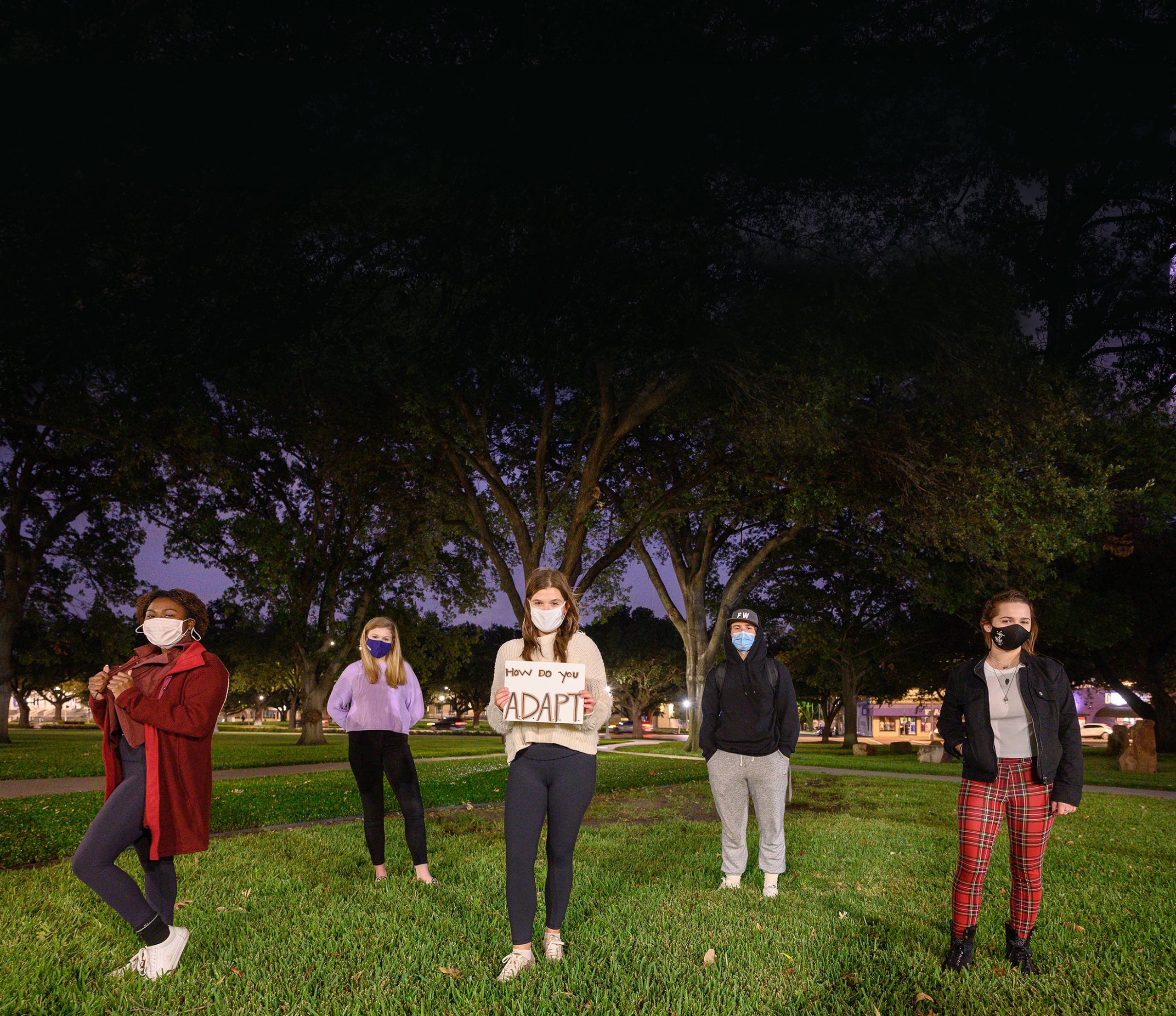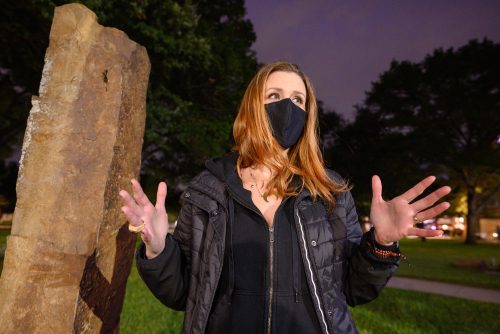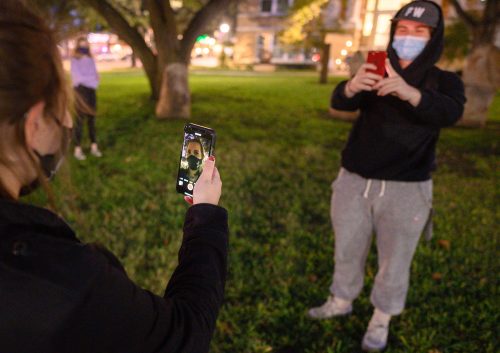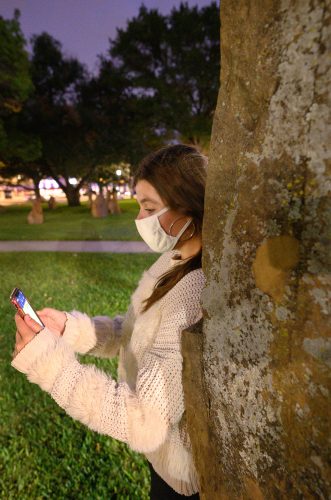Theatre Students Adjust and A.D.A.P.T. in Pandemic
A free-form digital project combines creativity with technology.

With fall 2020 plays canceled because of Covid-19, theatre students went virtual for the A.D.A.P.T. Projects. From left: Jaden Lewis, Emma Maples, Allowyn Schultz, Spencer Sloan and Schuyler Seitz formed one team assigned to conceptualize and create a video production. Photo by Glen E. Ellman
Theatre Students Adjust and A.D.A.P.T. in Pandemic
A free-form digital project combines creativity with technology.
“Hope is the thing with feathers / That perches in the soul / And sings the tune without words / And never stops — at all.”
Three performers in masks adorned with the words “hope,” “soul” and “abash” recited the Emily Dickinson poem to a camera from different spots on the TCU campus. Their orations were the opening salvo of a seven-minute video project.
The first line of the poem provided a jumping-off point for their own thoughts and verses, set against images like a sailboat at sunset, a ballot box and gauzy drapes.
At the end of the piece, each participant addressed the camera.
Emma Colwell, a senior musical theatre major, concluded her group’s A.D.A.P.T. Project with: “Hope cannot be thwarted as long as we continue to reach out in love.”

Lydia Mackay, assistant professor of theatre, dreamed up the A.D.A.P.T. Projects after the pandemic moved classes online. Photo by Glen E. Ellman
Looking inward and reaching outward were at the heart of the A.D.A.P.T. Projects, which stands for academics, design, application, performance and technology. Lydia Mackay, an assistant professor of theatre, conceived the idea after spring 2020 classes pivoted online.
Her colleagues embraced the premise. Undergraduates seeking degrees in some aspect of theatre would spend the first half of the academic year working in small groups to produce a digital story.
“We thought it had a chance to be something memorable, educational and certainly useful,” said Harry Parker ’80, professor and chair of the theatre department, which required all of its 140 or so majors to participate in the project during fall 2020.
Each of the 32 cohorts had a faculty mentor, and the student teams had three months to create a video five to 10 minutes in length.
“I’m thrilled by the variety in terms of how they told their stories,” Mackay said. “Some had me belly-laughing. Some had me weeping. Some creeped me out.
“And some had me in complete awe of our students and the potential for this future generation of theatre artists.”
Making Their Mark
About the only parameters the students received during the first week of class in August were the length of the finished piece and a rule forbidding the use of any copyright material. The professors then divided the students into groups of three to five.
“Oftentimes in the professional world, you don’t have much direction. You are bringing your tools, and that’s why you are hired.”
Tristan Decker
The ideal cohort would include one Bachelor of Fine Arts student from musical theatre, one from acting, one from design/tech, one from theatre studies — disciplines with different emphases — as well as one Bachelor of Arts student. The faculty also sought cross-pollination across class levels, striving to place a freshman, sophomore, junior and senior in each group, though the ideal mix was not always possible.
“We made a specific decision on this project for the students to work with people they didn’t know as well,” Parker said.
Freshman Carla Robertson, a theatre major, said she initially felt intimidated by her collaborators, all upperclassmen.
“I was so scared at first and kept wondering if they were going to be nice,” she said. “Instead they were sad for me that I hadn’t gotten the chance to have an actual college experience.”
Worse than the nerves about the potential group dynamic, Robertson said, was having so little guidance on what to do.
On the table was any type of visual storytelling medium: puppets, dance and movement, singing, monologues shot on smartphones, animation. Topics and themes fell to the students to choose as well.
“We told them that they didn’t have to create something brilliant or profound but that they did have to do something creative,” Parker said.
“Oftentimes in the professional world, you don’t have much direction,” said Tristan Decker, an associate professor of professional practice. “You are bringing your tools, and that’s why you are hired.”
Halftime Huddle
Students like Colwell emerged as leaders, organizing brainstorming sessions and setting up weekly Zoom meetings.
After two students left Colwell’s group of four, musical theatre faculty member Jessica Humphrey stepped in to fill the void.

Students like Schuyler Seitz and Spencer Sloan wrote, designed, directed and performed a virtual play to keep growing in their craft in the midst of a pandemic. Photo by Glen E. Ellman
“Persistence is a lesson to be learned inside the A.D.A.P.T. Projects,” said the instructor. “And that’s something this generation of college students will really benefit from recognizing and learning about.”
Artists can’t always make perfect things, Humphrey added. “We have to make mistakes and blunders in order to move to the next, better version.”
Persistence proved pivotal when many of the groups grew discouraged or started to struggle.
Allowyn Schultz, a junior seeking a degree in theatre, said she does well with structure, directions and guidelines. The limitless aspect of A.D.A.P.T. made her nervous at first.
Sensing an impasse with many of the groups, the professors took to Zoom in October for a class confab — part info session, part Q&A and part pep talk.
Jaden Lewis, a sophomore musical theatre major, said the meeting cleared up the uncertainly her group felt about the project.
“It flipped my outlook,” she said. “I started to get excited about the freedom they were giving us.”
Production Values
From the outset, Sam Sturgeon appreciated the autonomy inherent to A.D.A.P.T. The senior acting major was able to pursue his interest in playwriting and scriptwriting, creating a piece centered on families during the 2020 holiday season.
Sturgeon spent hours editing the video snippets that his cohort members sent him, a skill he expects to serve him well as he tries to break into the profession.
Mackay, who had been set to direct Macbeth for fall 2020, appreciated how students explored other avenues.
“There’s something so powerful about creating something with other people. It brings you close.”
Allowyn Schultz
“An actor can design a costume and sew a costume,” she said. “That same actor can write the story and produce the story. We are creating theatre artists, not just actors or stage managers — the whole artist.”
Schultz and Lewis, who were in the same group, relished the experience of taping their piece, which focused in part on the loneliness of quarantine. Their cohort met on an October afternoon at Froghenge to shoot the final scenes, which depicted joyful reunions in a post-Covid-19 world.
“There’s something so powerful about creating something with other people,” Schultz said. “It brings you close.”
The weekend after the projects’ November due date, the faculty watched all of the videos and voted on the top 12. Seeing the variety of topics and different modalities of storytelling delighted Parker and Mackay.
One theme emerged in many of the productions: the idea that life will constantly throw curveballs your way. Many of the cohorts emphasized how a positive mindset and strong social support can help combat isolation and stress.
After the theatre professors had their first look at the submissions, they shared all of the videos with the entire class. In late November, the 12 projects with the most faculty votes (“The Dirty Dozen”) were streamed on Vimeo.

Allowyn Schultz works on her A.D.A.P.T. Project at Froghenge. Photo by Glen E. Ellman
Some students expressed disappointment that their work was not selected to highlight. That’s yet another part of the learning experience, said the faculty, and a reality in the competitive arena of the performing arts.
“With shows and projects and classes, you learn more from the things that don’t work than you do with the things that succeed,” Humphrey said. “That’s one of the reasons making this an excellent educational pursuit.”
Though live performances should resume in the fall, Mackay doesn’t count out an A.D.A.P.T. 2.0 in the future. The department as a whole found A.D.A.P.T. exciting and ultimately worthwhile,
she said.
“Making art can be really, really messy,” Mackay said. “This project has the potential to teach our students that we don’t have to always make perfect things, but we have to start somewhere.”

Your comments are welcome
Comments
Related reading:
Features
How TCU Met the Virtual Challenge
The creativity of professors gives students a classroom experience online.
Web Extras
TCU Magazine Podcast: Alison Whitehurst
The alumna was in the middle of an acclaimed musical tour when the coronavirus restricted public gatherings and the tour was canceled.
Features
How Covid-19 Has Altered University Life
College goes virtual during the coronavirus pandemic and disrupts plans for graduating seniors.